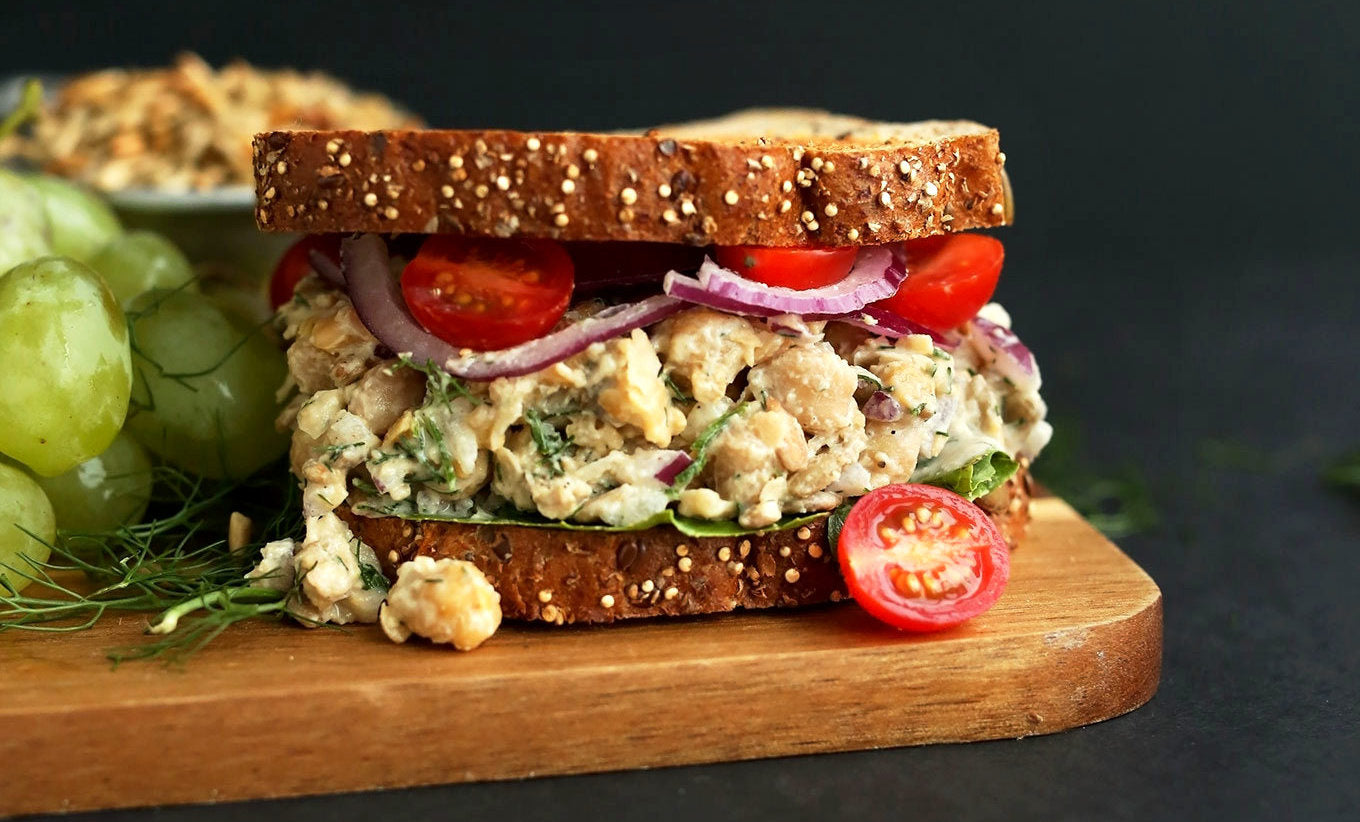Why choose a plant based diet?
-

Feel Better
Boost your energy, reduce inflammation.
-

Lose Weight & Keep it Off
Never count calories again.
-

Protect Your Health
Lower cholesterol and blood pressure, reduce your risk of chronic disease.
-

Save Money & the Planet
Cut grocery costs and lighten your environmental footprint.
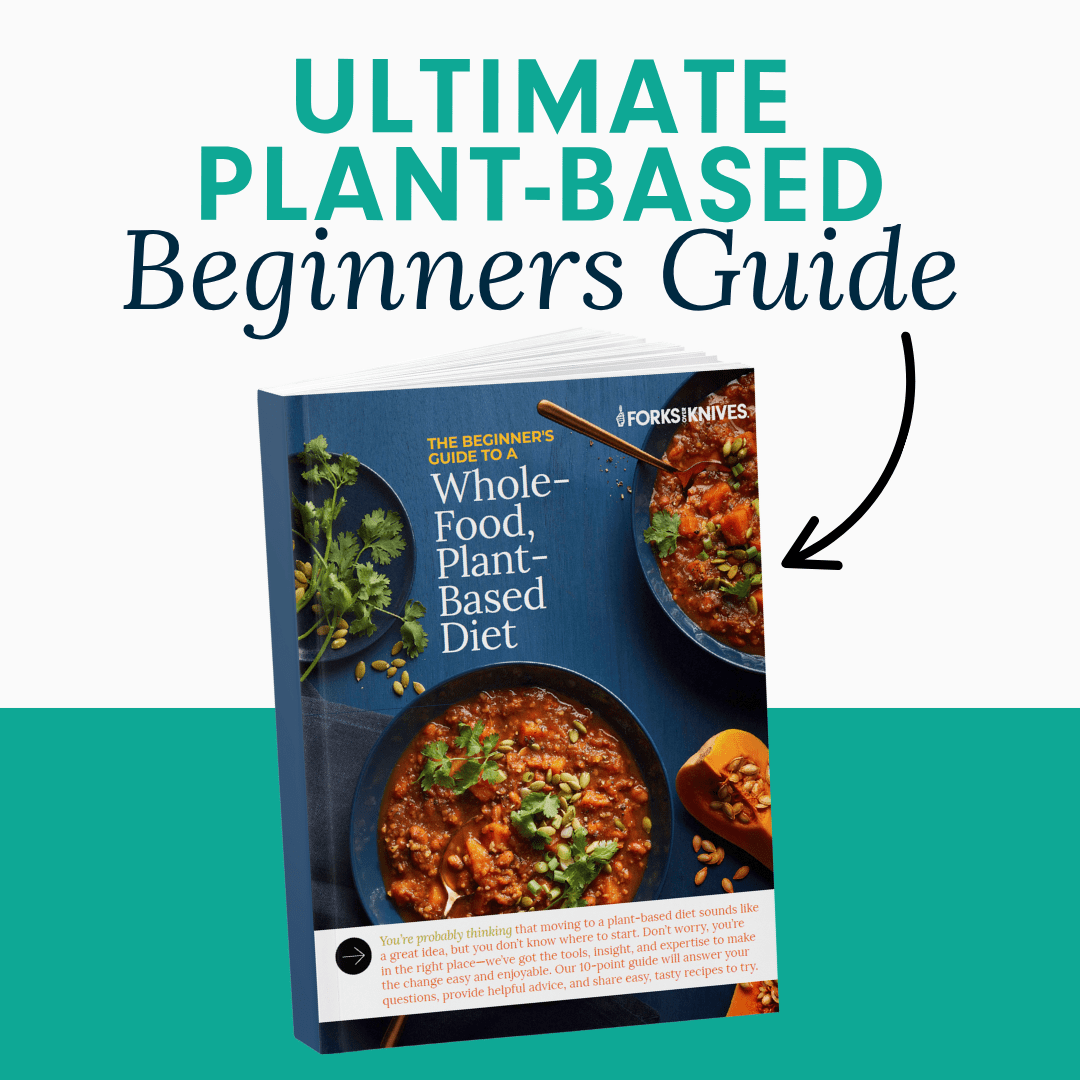
How a Plant-Based Diet Can Boost Your Health
One of the most powerful steps you can take to improve your health, boost energy levels, and prevent chronic diseases is to move to a plant-based diet. If you’ve seen the Forks Over Knives film, you know that science shows changing your nutrition is a powerful way to maintain a healthy weight, live longer, and support the environment.
There’s excellent scientific evidence that many chronic diseases can be prevented, controlled, or even reversed with a whole-food, plant-based diet. Scientific research highlighted in the landmark book The China Study shows that a plant-based diet can reduce the risk of Type 2 diabetes, heart disease, certain types of cancer, and other major illnesses. Many people also report bigger fitness payoffs, more energy, reduced inflammation, and better health outcomes after making the switch.
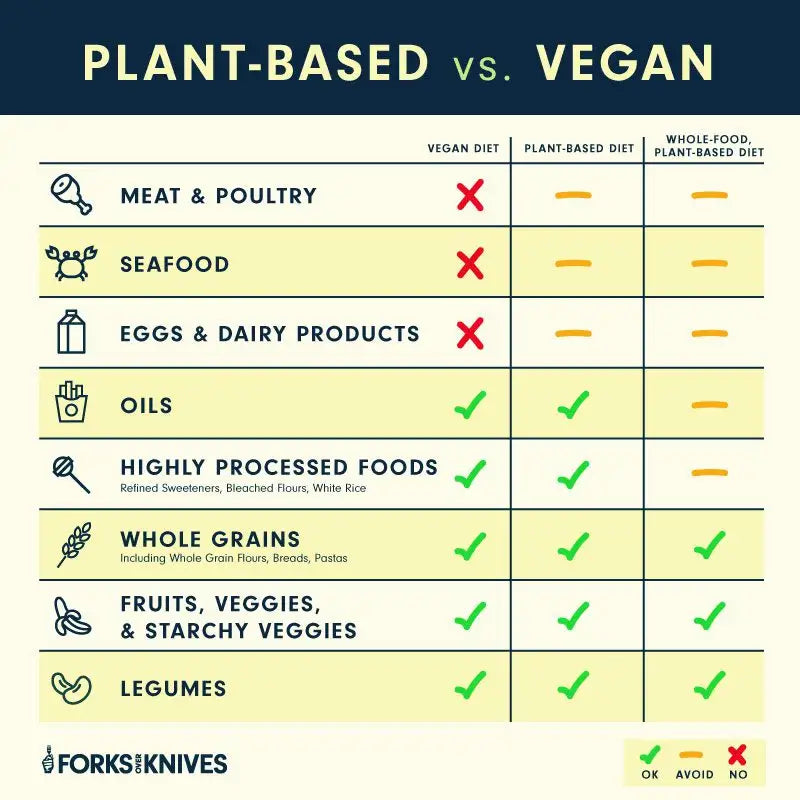
What Is a Whole-Food, Plant-Based Diet?
A whole-food, plant-based (WFPB) diet is based on the following principles:
”Whole foods”: Natural foods that are not heavily processed. That means whole, unrefined, or minimally refined ingredients.
“Plant-based”: Food that comes from plants and is free of animal ingredients such as meat, milk, eggs, or honey.
There is overlap between whole-food, plant-based (WFPB) and vegan diets, but there are also some key differences. A vegan diet can include highly processed imitation meats and cheeses; a WFPB diet eschews these products in favor of whole or minimally processed, close-to-nature foods that make it easy to meet your nutritional needs.
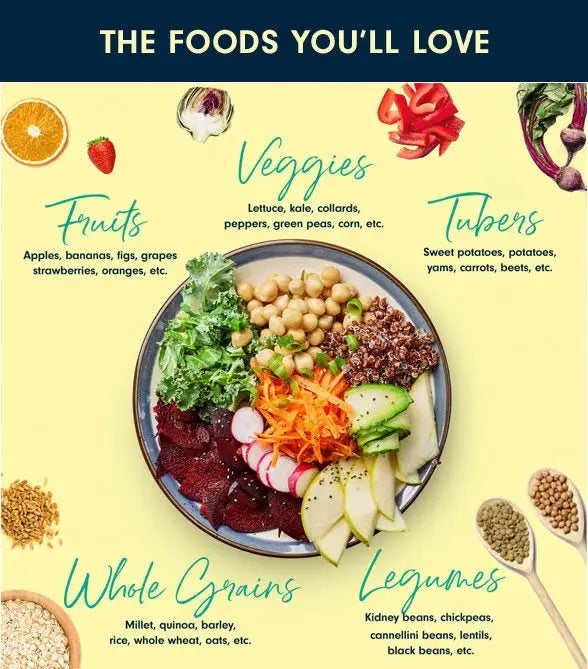
The Five Food Groups
Below is a quick overview of the major food categories you’ll enjoy on a plant-based diet, with examples. For a more detailed breakdown of what to eat on a WFPB diet, check out The Forks Over Knives Diet Explained.
- Fruits: Any type of fruit, including apples, bananas, grapes, strawberries, citrus fruits, etc.
- Vegetables: Plenty of veggies, including peppers, corn, lettuce, spinach, kale, peas, collards, etc.
- Tubers: Starchy root vegetables, such as potatoes, sweet potatoes, yams, and cassava (aka yuca).
- Whole grains: Grains, cereals, and other starches in their whole form, such as quinoa, brown rice, whole wheat, oats, popcorn, etc.
- Legumes: Beans of any kind, plus lentils, pulses, etc.
There are plenty of other foods you can also enjoy, including nuts, seeds, avocados, tofu, tempeh, whole-grain flours and breads, and plant-based milks. However, we recommend eating these foods in moderation, because they are more calorie-dense and can contribute to weight gain.
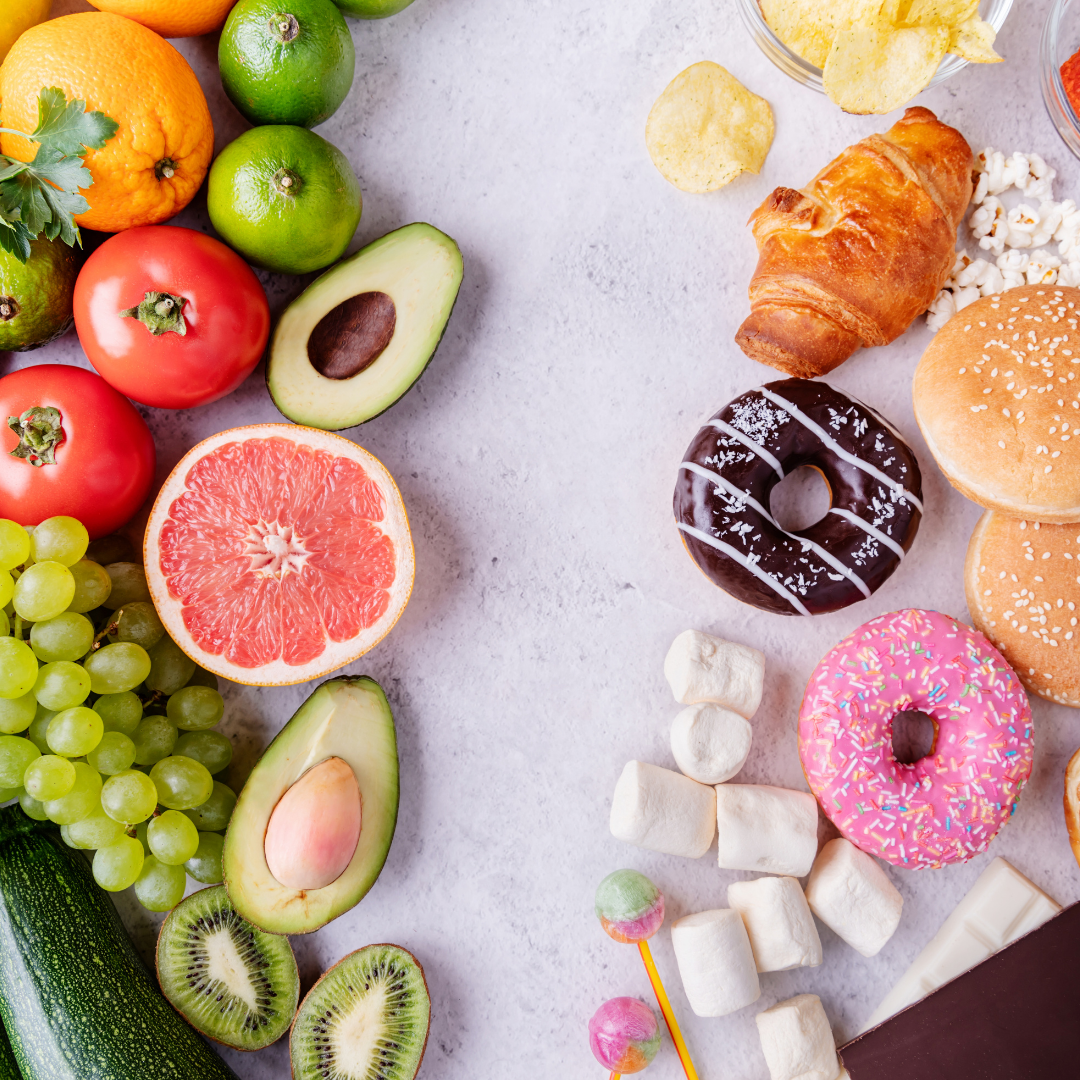
The Benefits of a Whole-Food, Plant-Based Diet
There are several major benefits to moving to plant-based nutrition, all supported by science. Plant-based diet benefits include:
- Easy weight management: People who eat a plant-based diet tend to be leaner than those who don’t, and the diet makes it easy to lose weight and keep it off—without counting calories.
- Disease prevention: Whole-food, plant-based eating can prevent, halt, and in some cases reverse chronic diseases. The scientific evidence is especially overwhelming when it comes to heart disease and diabetes, but research has also linked plant-based diets to lower rates of arthritis, improved liver function, and healthier kidneys.
- A lighter environmental footprint: A plant-based diet places much less stress on the environment.
Read on for a deeper look at some of the key benefits of a whole-food, plant-based diet.
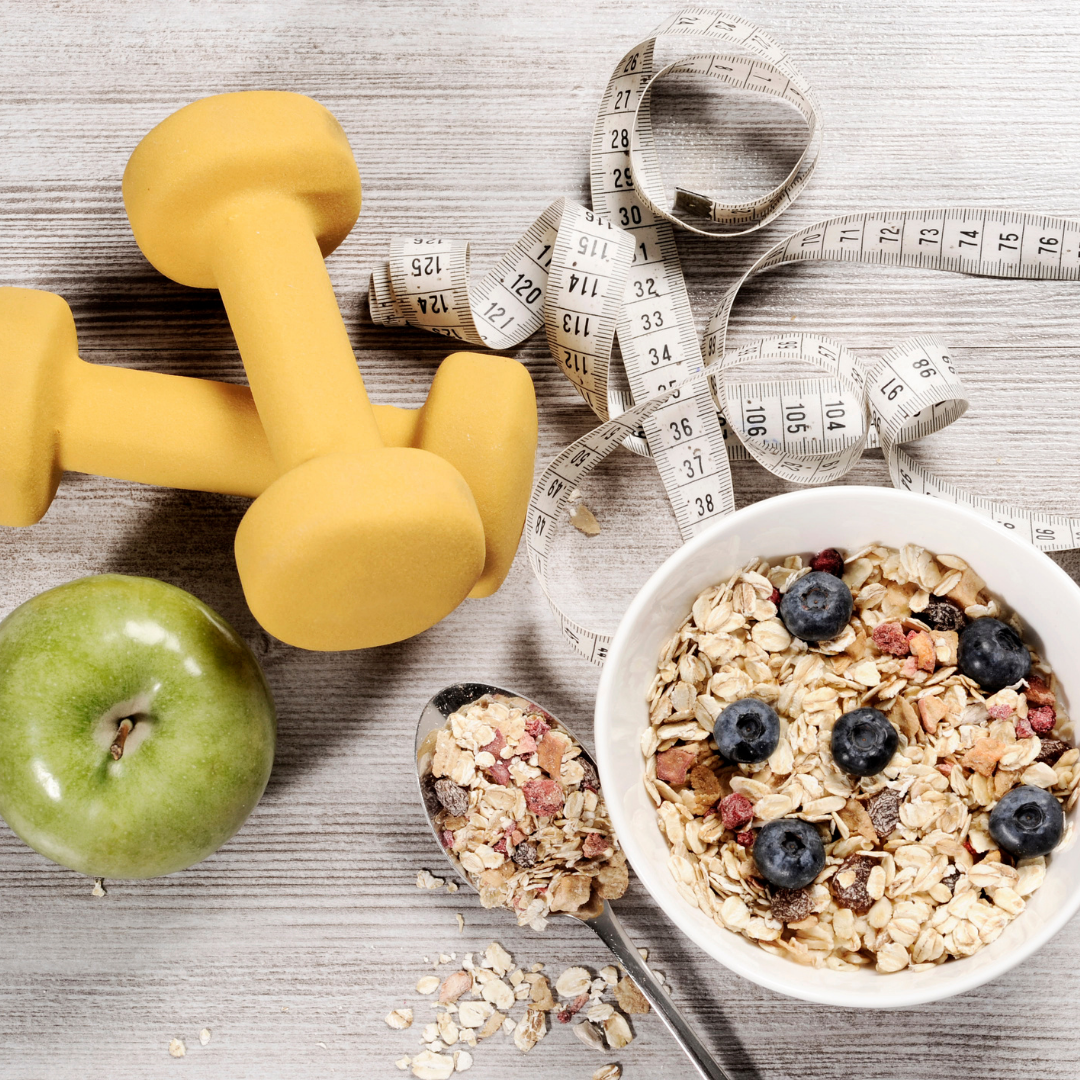
Easy Weight Management
If you’re looking to lose weight (and keep it off), a whole-food, plant-based diet is one of the most powerful tools at your disposal. Research shows that people who eat plant-based diets tend to be leaner than those who don’t. A 2020 review looked at 19 intervention studies and found that in each one, participants assigned to plant-based diets lost weight.
Why are healthy plant-based diets so effective for weight loss? Research suggests that the crux is calorie density. Meat, dairy products, and highly processed foods are high in calories yet low in the fiber that helps us feel full and fuels a healthy gut microbiome. Whole plant-based foods are low in calories, meaning you can eat a high volume of food without exceeding your calorie needs. That’s why on a whole-food, plant-based diet, you’re encouraged to eat until you’re comfortably satiated—no calorie counting or portion control necessary.
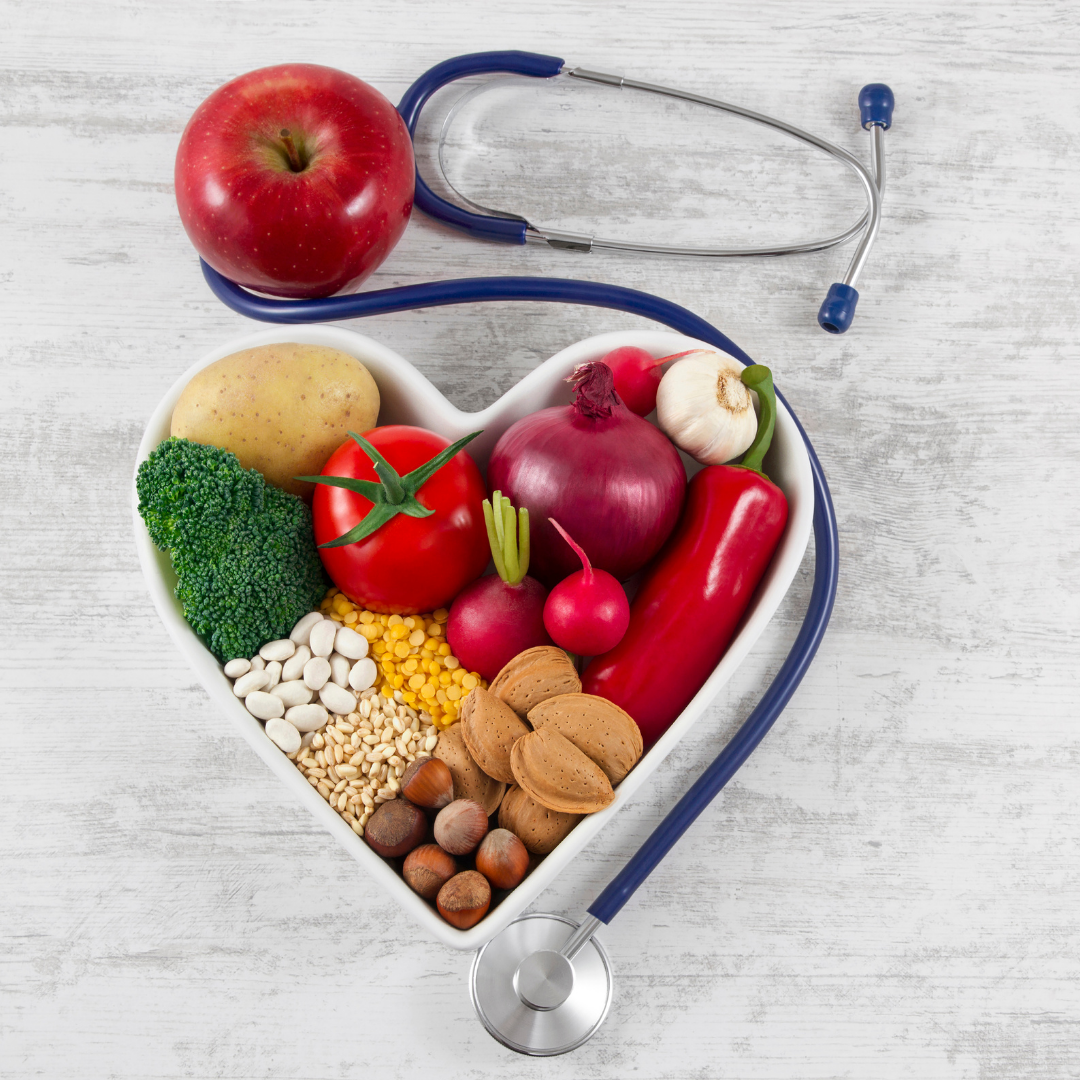
Improve Heart Health
A whole-food, plant-based diet is extremely effective at promoting cardiovascular health and preventing, halting, and in some cases reversing heart disease, the leading cause of death in the United States. A 2021 review of 99 studies found that diets rich in whole and minimally processed plant-based foods were associated with significantly lower risk of cardiovascular disease compared with diets high in meat and dairy products.
There are several reasons for this. Animal-based foods are high in saturated fat and cholesterol, which raise blood cholesterol levels, causing fatty, wax-like plaque to build up in the arteries. Highly processed foods often contain excessive salt, which raises blood pressure, damaging the lining of the arteries over time. By eliminating these harmful foods from your diet and replacing them with whole plant-based foods, you can bring down your cholesterol levels, blood pressure, and risk of heart disease. Learn more about diet and heart disease here.
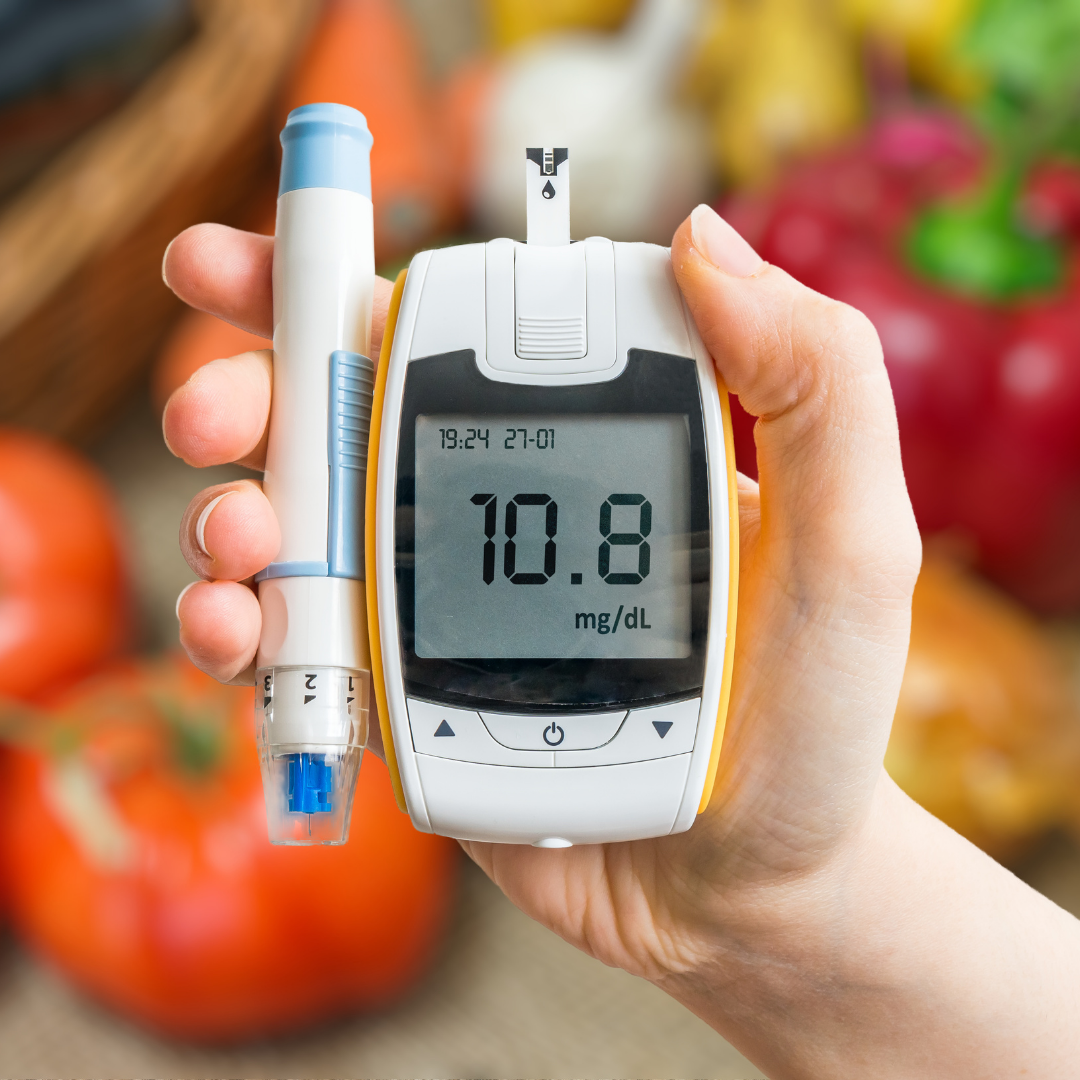
Prevent or Reverse Type 2 Diabetes
Healthy plant-centered diets are associated with significantly lower rates of Type 2 diabetes and improved outcomes in those who already have this dangerous chronic condition.
A 2018 report in BMJ Open Diabetes Research & Care found that for people with Type 2 diabetes, plant-based diets were more beneficial than the diets recommended by several diabetes associations, offering greater improvements in physical and emotional well-being.
Plant-based diets are low in saturated fat (a culprit behind insulin resistance) and high in fiber, which helps the body to regulate blood sugar and properly absorb nutrients. Plant-based diets also reduce the risk of being overweight or obese, a primary risk factor for Type 2 diabetes. Learn more about diabetes and diet here.
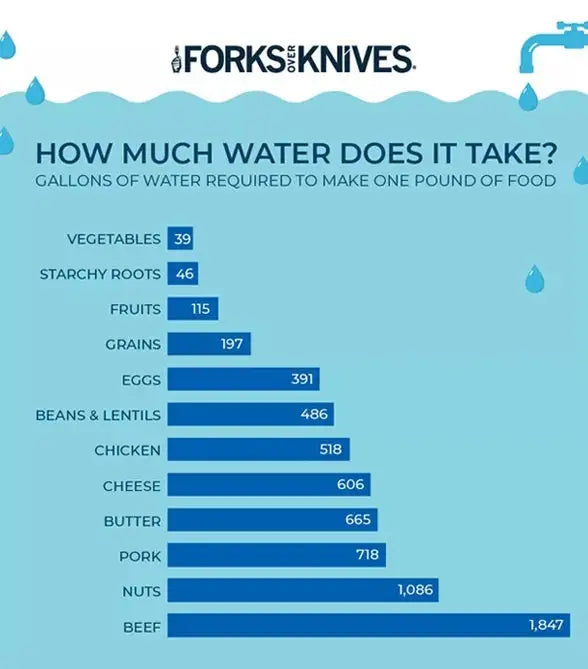
It's Better for the Planet
Plant-based diet benefits also extend beyond your own body: Switching to a WFPB lifestyle is one of the best things you can do for the environment. The main reason is that raising animals for food is an incredibly inefficient use of resources.
Growing crops to feed animals “introduces a major extra step of waste relative to the efficiency of us just eating the plant foods directly,” explains David L. Katz, M.D., MPH, FACPM, FACP, FACLM. “If you just eat the plants, you cut out the middleman.” A 2018 analysis found that livestock provides just 18% of calories consumed globally but takes up 83% of farmland. Vegan and plant-based, whole-food diets are also associated with fewer climate-altering greenhouse gas emissions.
Learn more about your diet’s impact on the environment here.
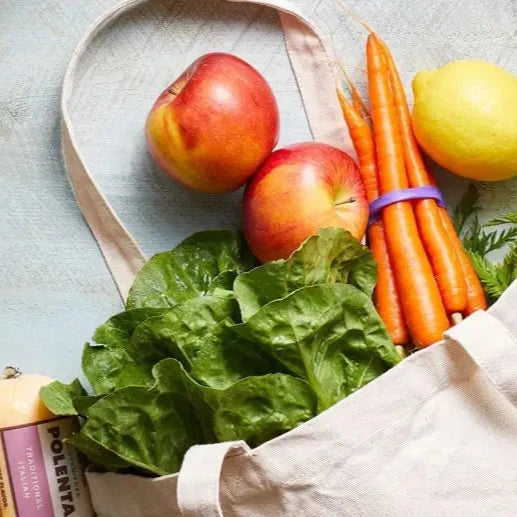
It'll Save You Money on Groceries
Whole and minimally processed plant-based foods are not only the healthiest and most sustainable foods around; they’re also some of the most affordable. In fact, going plant-based can cut grocery bills by $750 a year per person, according to research published in the Journal of Hunger & Environmental Nutrition.When you stock your kitchen with WFPB staples such as brown rice, potatoes, and dried beans, you can assemble nutritious, satisfying meals for just a few dollars. To showcase just how affordable plant-based diets can be, we’ve put together a budget-friendly one-week vegan meal plan: How to Eat Plant-Based for Just $3 a Meal.
Real People, Real Results
Thousands have improved their health with plant-based eating.
-

“Today I’m 80 pounds lighter. I have not had an asthma flare-up since I changed my diet. I’m now a long-distance runner, an athlete, an active musician, and the mom I want to be!”
— Jane Elizabeth
-

“Since we went plant-based, I’ve dropped 150 pounds, while [my wife] Sonia’s lost 45 pounds—and we’re not even trying.”
— Stephen Steinbach
-

“My cholesterol has dropped 130 points. Even more significantly, I’ve cut my LDL cholesterol number in half. It’s amazing what our bodies can do when we just get out of the way and let them work.”
— John Brown
-

“I was able to reverse my diabetes within just a few months on this diet.”
— Howard Bielich
Everything You Need to Succeed
-

Meal Planner
Custom plans, grocery lists & easy prep guides.
-

Cooking Course
Master plant-based cooking with Jackie Akerberg
-
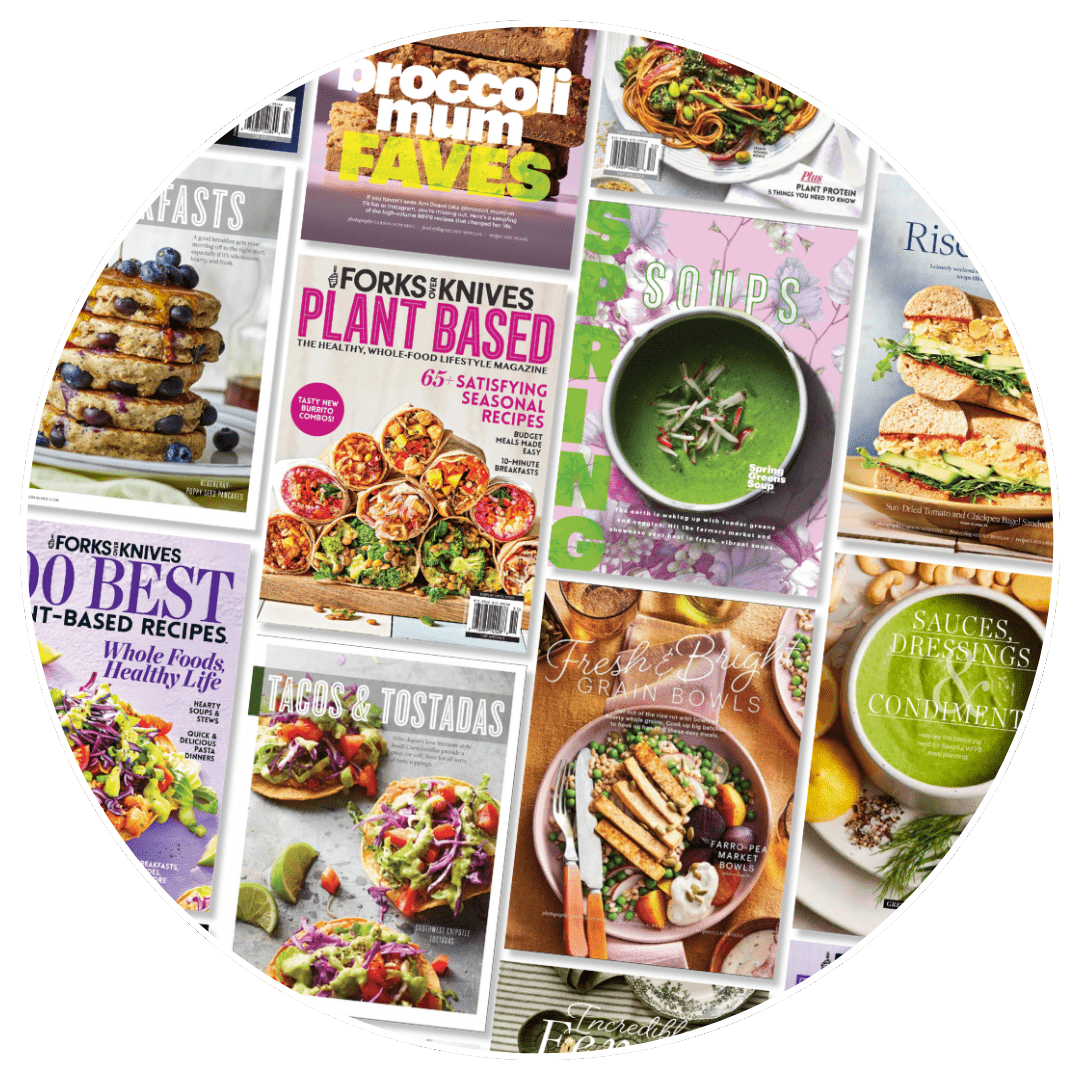
Books & Magazines
Get expert tips, recipes & inspiration.
Your Questions, Answered
How do I know if a whole-food, plant-based diet is for me?
You don’t—until you try it! So many people who make the switch report feeling much better, having less fatigue, losing excess pounds, and otherwise enjoying a healthy lifestyle. We make the switch super easy with our extensive tools and resources.
READ MORE
Can I eat a plant-based diet on a budget?
Whole-food, plant-based eating is cheaper than you think. Fresh produce goes a long way, and whole grains, potatoes, and beans are some of the most affordable bulk foods you can buy. Create meals around these staple items and you’ll definitely spend less than you do on a diet rich in meat and other animal products.
READ MORE
Tips For Vegan Shopping and Maximizing Savings at the Grocery Store
How do I eat out on a plant-based diet?
Most restaurants are very accommodating of dietary needs, and you should be able to review their menu online. Scan the menu in advance to see if a restaurant offers vegan options, and you’re already most of the way there. When you’re unsure, simply call ahead, explain your preferences, and they will probably be able to accommodate you.
READ MORE
How to Order a Healthy Plant-Based Meal from Any Restaurant Menu
How can I eat whole-food, plant-based food while traveling or away from home?
You will need to plan ahead a little, but it’s pretty easy to find whole-food, plant-based meals on the go. You can usually find fruit and dishes made with pasta, rice, and potatoes wherever you are. With a little creativity and flexibility, you can also prepare some fantastic food to take with you.
READ MORE
4 Plant-Based Recipes You Can Make in a Hotel Room, and Other Healthy Travel Hacks
How do I make sure I get the nutrients I need?
Whole and minimally processed plant-based foods contain all the essential nutrients (with the exception of vitamin B12) we need. You can get some B12 from fortified foods such as plant-based milks and breakfast cereals, but the best source is a simple B12 supplement. (In fact, the U.S. Department of Health and Human Services recommends supplemental B12 for all adults over age 50 because as we age, many people lose the ability to absorb vitamin B12 from food sources.)
READ MORE
Is a whole-food, plant-based diet the same as being vegan?
While there are certainly some similarities between eating a whole-food, plant-based diet and being vegan, there are some key differences as well.Vegans avoid all animal products or exploitation in food, clothing, shoes, or any other aspect of their lives. Vegans do not necessarily focus on whole plant-based foods; they may eat refined and processed foods, although many choose not to. By comparison, a whole-food, plant-based diet is defined as one that eliminates or minimizes all animal products and highly refined foods. Loading up on fiber-rich, nutrient-dense, close-to-nature foods makes it simple to meet your nutritional needs without exceeding your caloric needs. FOK teaches the gold standard plant-based diet, which is completely free of animal products and therefore vegan.

